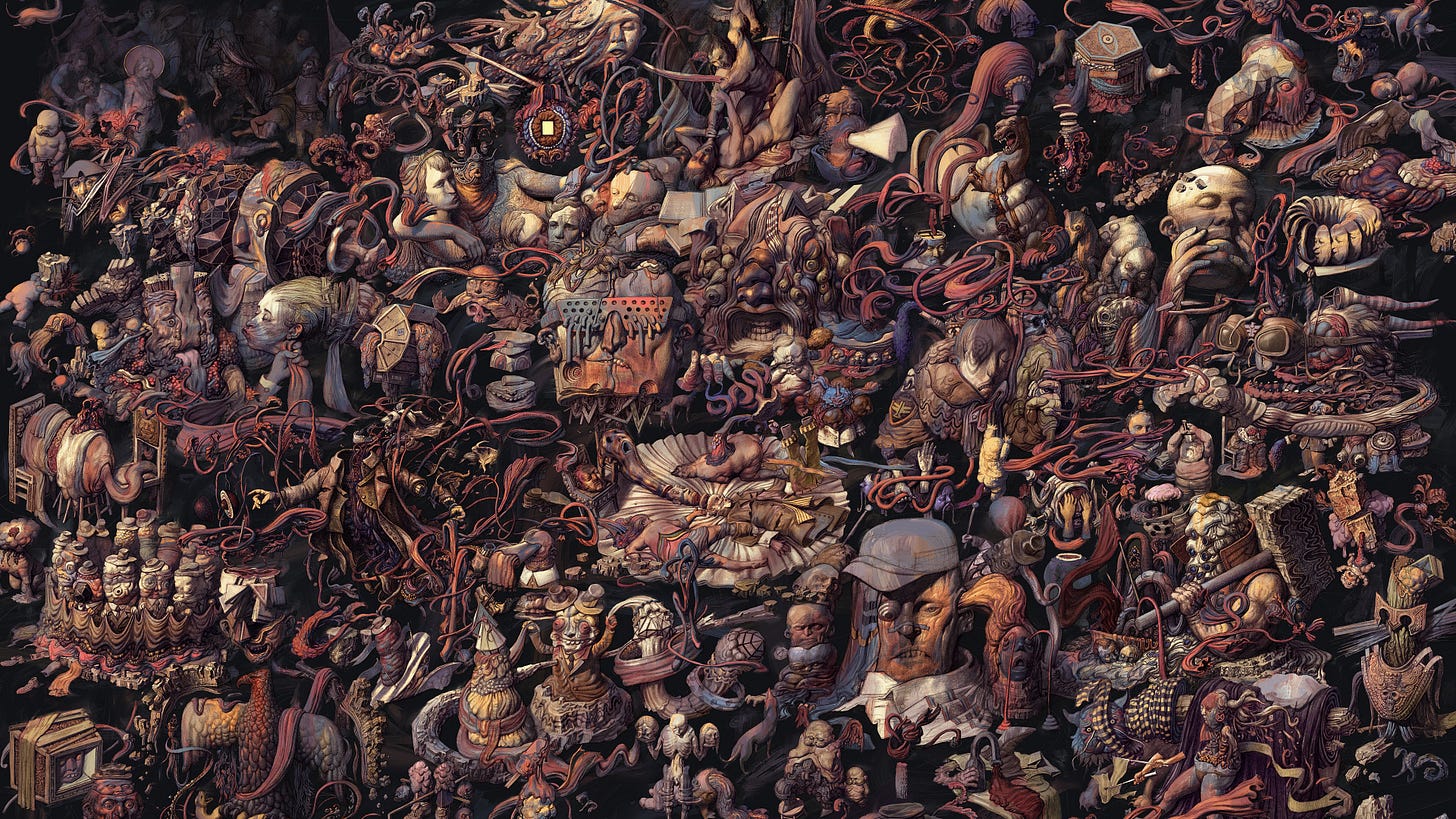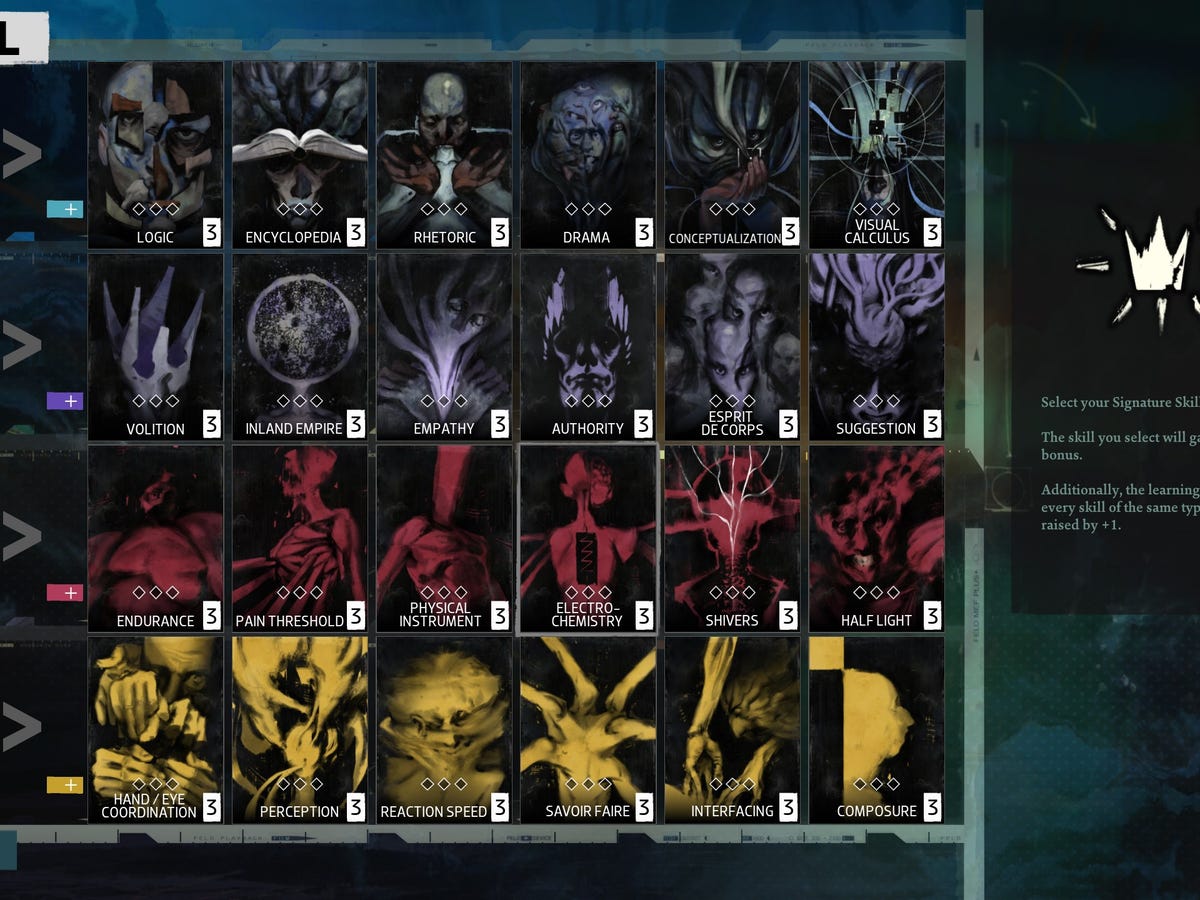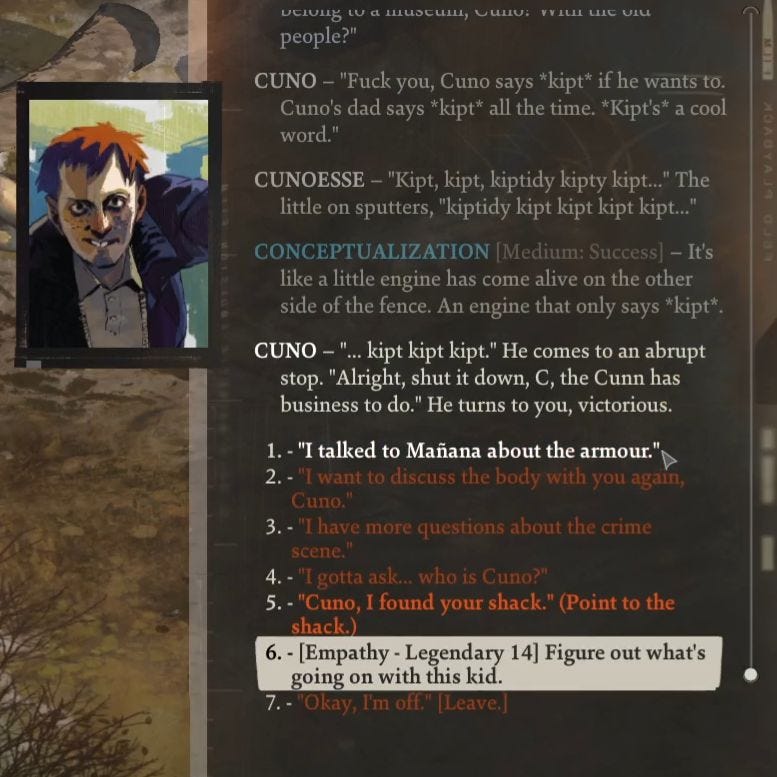Four Games That Changed My Brain Chemistry, Part 1: Disco Elysium
Spoiler warning: This essay contains minor spoilers for Disco Elysium
I have quite a few all-time favorite games, but some have had such an immense impact on how I perceive things that I could almost chart my life around them. They don’t necessarily have to be my favorites, but it so happens that they are. These games have influenced me in many ways—shaping how I view video games, how I approach the world and people around me, and even introducing me to ideas that have transformed how I position myself within the world. I mean this seriously. So, without further introduction, here are the four games that resonate deeply with me.
Disco Elysium
I'm not into traditional RPG games, I don't like tabletop games, and I don't enjoy rolling the dice. I think this is mostly because specific instances of such games haven't resonated with me deeply enough; I tend to enjoy carefully hand-crafted experiences more than emergent ludo-narratives through gameplay. Fortunately for me, I had no idea that Disco Elysium was a role-playing game in any way—I dove straight into it purely because of word of mouth, fueled by the constant praise from people on the internet who play the latest and greatest games. I'm not usually one of them; only a handful of times have I played a game upon its release.
I'd like to blame the state of many games at launch—often incomplete or buggy—but the truth is, I have a compulsion to play games when they are considered finished, done, complete with all their seasonal content, DLCs, and, in the case of Disco Elysium, the Director's Cut. It’s a game so humane and masterful in every aspect of game design that it made me completely forget my disinterest in the RPG genre.
Disco Elysium is a psychological RPG, meaning that, instead of relying on rigid stats that reduce character traits to straightforward attributes like Intelligence, Physical Defense, or Strength, it uses nuanced, soft Skills. This approach allows for a more intricate and introspective form of role-playing, where your character’s inner world is as dynamic and influential as their outer actions. Here’s a screen showing these Skills alongside their portraits:
These skills function almost like sub-personalities, guiding you through dialogue options, allowing you to perform certain physical activities, and sometimes even speaking directly to you—which is all beautifully voice-acted. They remind me of the emotions from Pixar's Inside Out, but they’re more granular and occasionally even supra-natural.
For example, the Encyclopedia skill might provide explanations for unknown concepts during character interactions, while Shivers lets you become more attuned to the events unfolding in the city: "Raise the hair on your neck. Tune in to the city." My favorite fact is that reaching a Legendary (highest) level in Empathy can help you understand the troubled kid, Cuno. I can relate to this, as I’m not great at talking to kids.
The game's fictional setting closely mirrors the political and social turmoil of the mid-to-late 20th century, particularly in Europe after World War II. Revachol, the game's city, is a blend of post-war cities like Berlin, Paris, or Sarajevo, where the scars of revolution, occupation, and political upheaval are starkly visible.
Our protagonist, Detective Harrier "Harry" Du Bois, begins the game with amnesia, and these skills become his primary tools for understanding and navigating the world around him. The amnesia serves as a compelling framework, allowing the player to assume Harry’s character while also demonstrating how we construct our understanding of the world—building concepts on top of preexisting ones, starting from the most primal levels like the "Ancient Reptilian Brain." Distilling facets of personality into these "skills" is, in my view, a stroke of genius.
Not only do these skills offer a modern alternative to the traditional stats found in RPGs, but they also provide a unique perspective on how we interface with the world. Maybe you have a high Inland Empire—"Hunches and gut feelings. Dreams in waking life."—or low Composure or Reaction Speed. What I found even more fascinating is that having a high value in any skill can actually be detrimental. At high levels, Encyclopedia overexplains everything, burdening you with unnecessary details, while Empathy can put you too deeply into others' shoes, making you overly emotional or unstable. You must be careful about how much you invest in your personality traits, and this idea resonated with me. This "warning" permeates all actions in the game and can often lead to embarrassing situations if you aren't cautious.
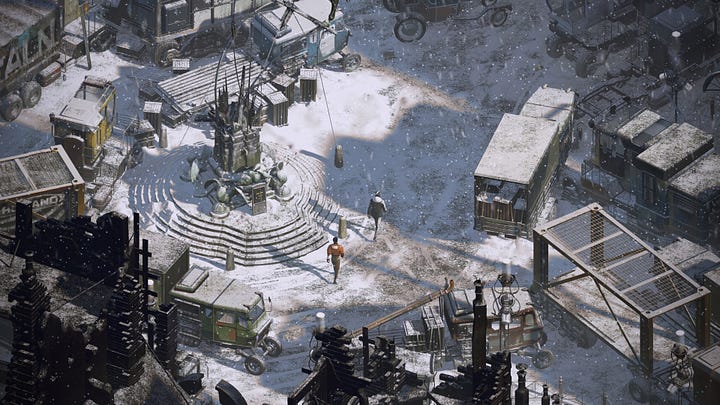
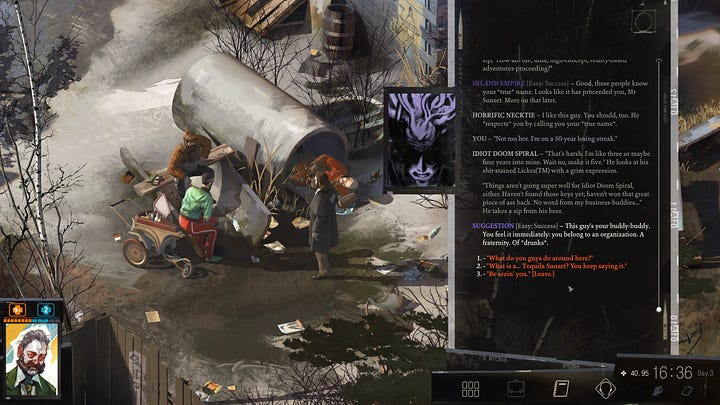
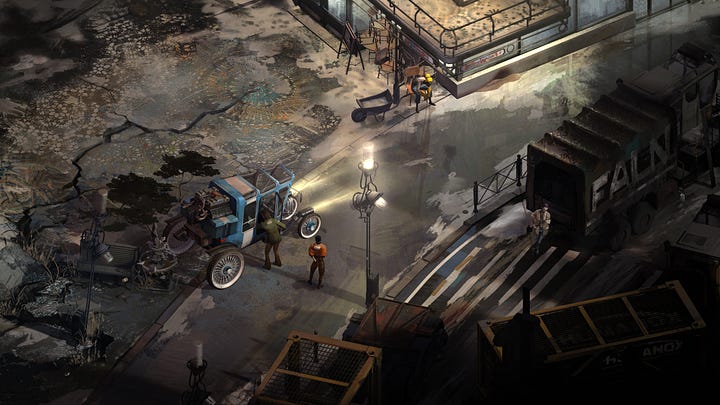
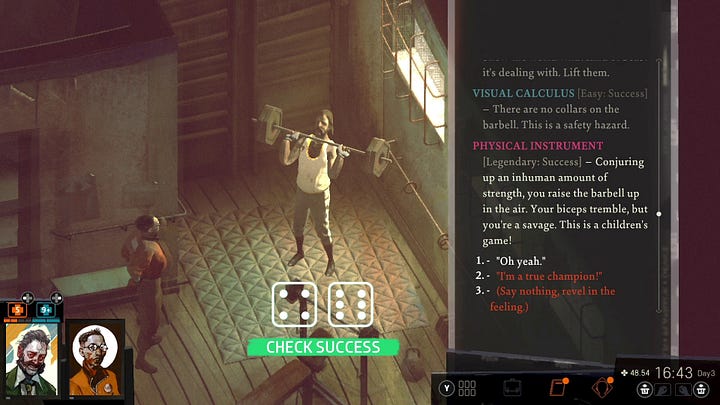
Role-playing games often emphasize failure as a core mechanic for progression, but few succeed as effectively as Disco Elysium. Even games I hold in high regard, like Mass Effect, aim to offer a personalized journey—going so far as to allow players to import save files into sequels for a tailored experience. Yet, the failure states in Mass Effect frequently feel like a sudden dead-end. For example, in Thane Krios's loyalty mission, failing to track down his son just abruptly ends the mission, leaving you with the feeling that you missed the "optimal" scenario. While there are narrative consequences for failing, the real-time experience often makes it clear that this wasn't the intended outcome the quest designers envisioned.
This is where Disco Elysium truly shines. It’s perfectly fine to fail; the game doesn't end but rather branches off in new directions that are often just as compelling. The brilliant writing ensures that failure states are not dead ends but instead feel like valid, alternative paths. This is a stroke of genius—I’ve never felt such freedom to project myself in a game. Instead of stressing over the possibility of missing something due to failure, I played with a sense of ease, embracing every outcome as equally meaningful.
This projection of self is best experienced when the game "reads" the player and, out of nowhere, a skill speaks to you, revealing something subtle about your playstyle or personality. For me, it was when the game called me out for being a "sorry cop" because I kept apologizing profusely out of fear of being disrespectful. It felt like the game had a deep understanding of my choices, mirroring back a reflection of myself in an almost unsettling way.
Spectacular writing made me love every character, whether I liked them or not. The game helped me view these characters as products of their surroundings, who used their own Skills to build the understanding of the world belief by belief. It’s a brilliant reminder that people are, in many ways, shaped by a chain of events and deeply held beliefs, forming a unique “bundle” of thoughts, feelings, and perceptions.
This approach has even influenced how I empathize with people who are different from me. I find myself thinking about the series of experiences and beliefs that led them to become the specific person they are—trying to see the world through their eyes, much like how the game encourages you to see beyond the surface of its characters.
Every line in Disco Elysium is crafted with purpose; there’s no filler, no placeholder dialogue. Each sentence perfectly captures the essence of a character, making them feel real, complex, and deeply human. This is further amplified by the incredible voice acting, which adds another layer of depth to the characters.
I even found myself appreciating characters like Joyce, the self-proclaimed bourgeois, who gives you a reality lowdown because she loves to share knowledge, or the gruff bartender at the Whirling-in-Rags, where you and your partner, Lieutenant Kim Kitsuragi, spend days unraveling the murder mystery. Even a character like Measurehead, the racist dockworker, is written with such precision that you can’t help but see the person behind the ideology.
It’s this level of detail and care in characterization that makes the world of Disco Elysium so compelling and why I keep thinking about these characters long after the game ends.
The creators of Disco Elysium aimed to imbue the city of Revachol with a Hegelian sense of history—making it feel as if every facet of its depiction is saturated with historical weight. They wanted it to feel fully lived-in, contrasting sharply with more static fictional settings like Star Wars, which often seem more idempotent or detached from any real sense of historical progression.
And they absolutely succeeded. Even though Revachol's history is entirely fictional, it mirrors our own history in a way that feels organic and instantly recognizable. Many players will pick up on the parallels, such as Kras Mazov clearly being a stand-in for Karl Marx, EPIS reflecting the EU, and anodic music representing electronic music, among other references. This deep, reflective design gives Revachol a vivid, tangible sense of realism that makes it feel alive and resonant with the real world, despite being entirely invented.
Visually the game is also marvelous, it's an amalgamation of painterly expressionism, post-Soviet aesthetics and elements from impressionism that shows in handling lights and shadows and capturing the essence of environment, rather than focusing too much on minute detail. Just zoom into the game and see it yourself! According to the game's artbook a cornerstone decision was to have the game shaped by artists rather than a committee. This artistic vision has undoubtedly paid off, as Disco Elysium stands as a triumphant piece of 21st-century art in my view. It took me around 30 hours to feel that I had explored all the content the game had to offer before moving on.
Disco Elysium tackles a wide array of themes, from the consequences of capitalism and workers’ rights to personal trauma, the concept of mysterious Pale as a product of human consciousness, and the struggles with alcoholism. All of these have been discussed to death, I don't imagine I can contribute much more to the analysis of its philosophical themes, nor do I feel I am qualified and eloquent enough to do so. What I can do is to reflect how much more this video game pushed me for self-inquiry, acceptance of reality as fundamentally incomplete when viewed through the lens of human consciousness and loving human beings around me, whether I like them or not.


